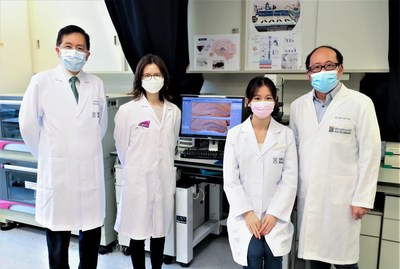
HONG KONG, July 8, 2022 /PRNewswire/ -- A joint research team from Li Ka Shing Faculty of Medicine, The University of Hong Kong (HKUMed) and City University of Hong Kong (CityU) has discovered that electrical stimulation of the eye surface can alleviate depression-like symptoms and improve cognitive function in animal models.

Major depression is the most common and severe psychiatric disorder across the world. Recently, the World Health Organization reported that the COVID-19 pandemic has triggered a massive increase in the number of people with anxiety and depression. Although treatments are available for depression, about a quarter of patients do not respond adequately to these treatments.
Assistant Professor Dr Lim Lee Wei, the principal investigator and also a former Singapore Lee Kuan Yew Research Fellow, reported in 2015 that deep brain stimulation of the prefrontal cortex in the brains of animals could improve memory function and relieve depressive symptoms. These therapeutic effects were attributed to the growth of brain cells in the hippocampus, a brain region known to be involved in learning and memory function. However, this technique also known as deep brain stimulation is invasive and requires surgery to implant electrodes in the brain, which may cause side effects such as infections and post-operative complications.
A team of Hong Kong researchers headed by Dr Lim Lee Wei, Dr Leanne Chan Lai-Hang, and Prof Chan Ying-Shing have been looking for alternative ways to treat neuropsychiatric diseases. They discovered that non-invasive stimulation of the corneal surface in the eye that activates brain pathways, resulted in remarkable antidepressant-like effects and also reduced stress hormones in an animal model of depression. This technique called transcorneal electrical stimulation also induced the expression of genes involved in the development and growth of brain cells in the hippocampus.
In related experiments, Yu Wing-Shan and other research members investigated whether this approach could also be used to treat Alzheimer's disease, a common type of dementia with no definitive cure. They found that this non-invasive stimulation in mice drastically improved memory performance and reduced beta-amyloid deposits in the hippocampus, which is one of the hallmarks of Alzheimer's disease.
Associate Professor Dr Leanne Chan, the lead researcher at CityU and an expert on the electrical stimulation of visual and non-visual brain targets, described this research, 'Transcorneal electrical stimulation is a non-invasive method initially developed to treat eye diseases, and it would be a major scientific breakthrough if it could be applied to treat neuropsychiatric diseases.'
'These research findings pave the way for new therapeutic opportunities to develop novel treatment for patients suffering from treatment-resistant depression and dementia, nevertheless, clinical trials must be conducted to validate the efficacy and safety,' remarked Professor Chan Ying-Shing of the HKUMed and Editor-in-Chief of IBRO Neuroscience Reports. The application of this non-invasive stimulation of the eye brings new hope for those with depression and dementia.
These significant findings were recently published in Brain Stimulation and Annals of the New York Academy of Sciences. Yu Wing Shan, who was the main researcher of these studies, and a recipient of the prestigious Hong Kong PhD Fellowship, awarded by the Hong Kong Research Grants Council at the HKUMed Neuromodulation Laboratory (www.drlimlab.com), in collaboration with CityU at the Neural Interface Research Laboratory (www.ee.cityu.edu.hk/~lhchan).
References
WS Yu, ACK Tse, L Guan, JLY Chiu, SZK Tan, S Khairuddin, SK Agadagba, ACY Lo, ML Fung, YS Chan, LLH Chan, LW Lim. (2022) Antidepressant-like behaviors by transcorneal electrical stimulation in rat models. Brain Stim. 15(3):843-856.
WS Yu, L Aquili, KH Wong, ACY Lo, LLH Chan, YS Chan, LW Lim. (2022) Transcorneal electrical stimulation enhances cognitive functions in aged and 5xFAD mouse models. Ann. NY Acad. Sci. DOI: 10.1111/nyas.14850.
Photo - https://mma.prnewswire.com/media/1855108/L_R__Prof_Chan_Ying_Shing_Dr_Leanne_Chan_Lai_Hang_PhD_Student.jpg

